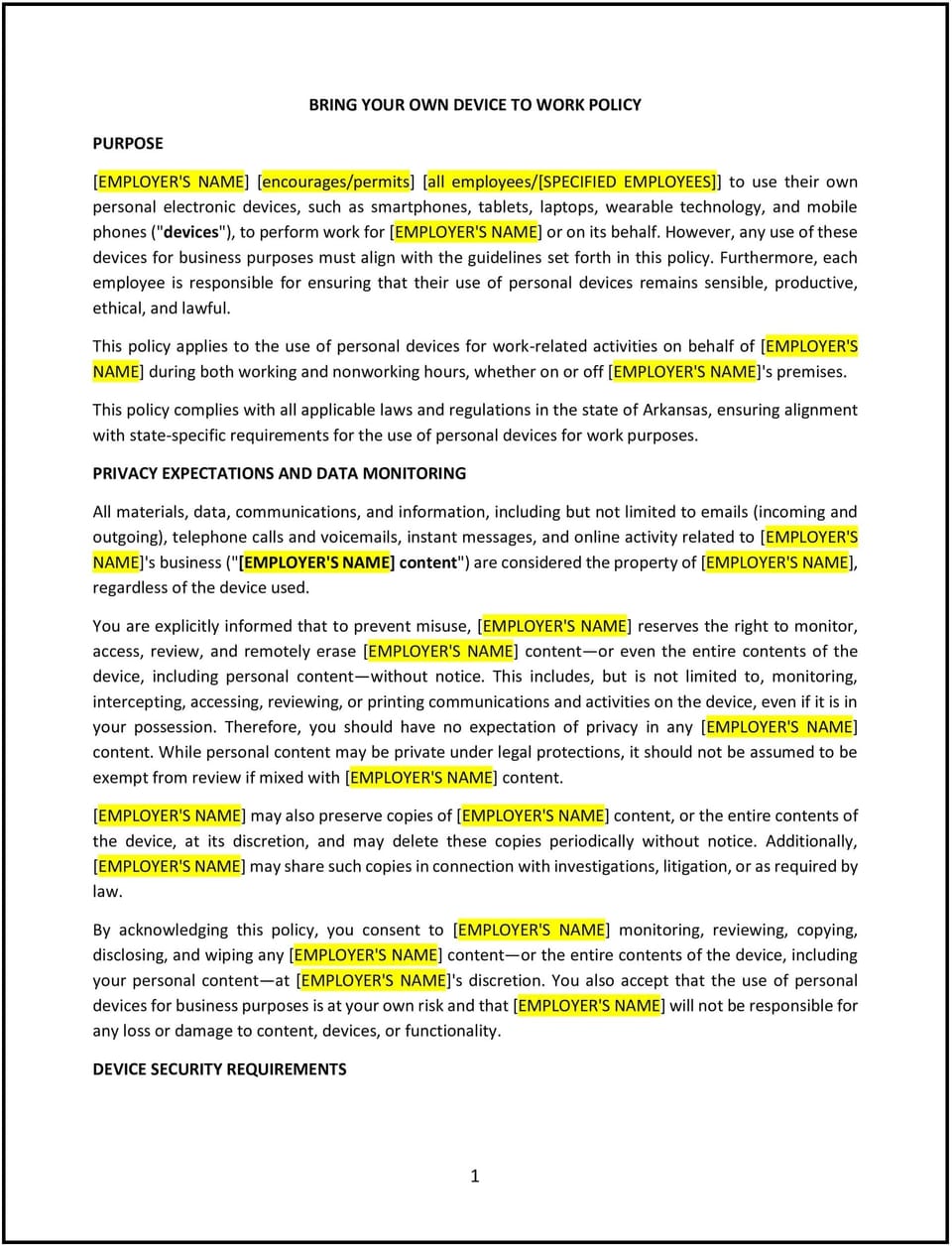Bring your own device to work policy (Arkansas): Free template

Bring your own device to work policy (Arkansas)
In Arkansas, a bring your own device (BYOD) policy provides businesses with guidelines for employees using personal devices, such as smartphones, laptops, or tablets, for work-related tasks. This policy ensures the secure use of personal devices while balancing employee convenience and business security requirements.
This policy outlines the rules for device usage, security protocols, and the responsibilities of both the business and employees. By implementing this policy, Arkansas businesses can enhance flexibility, improve productivity, and support compliance with data protection laws and cybersecurity standards.
How to use this bring your own device to work policy (Arkansas)
- Define acceptable use: Clearly outline what personal devices can be used for, including work-related communications, accessing company systems, and handling sensitive business information.
- Set security requirements: Establish security protocols for personal devices, such as mandatory password protection, encryption, antivirus software, and regular updates.
- Address data protection: Specify how business data will be stored, accessed, and removed from personal devices, ensuring compliance with data protection regulations.
- Outline reimbursement policies: Define whether the business will reimburse employees for work-related expenses, such as data usage or software required for accessing company systems.
- Provide training and support: Educate employees on BYOD security practices and provide technical support to ensure they can use their devices securely and efficiently.
Benefits of using this bring your own device to work policy (Arkansas)
This policy offers several advantages for Arkansas businesses:
- Enhances flexibility: Allows employees to use familiar devices, increasing convenience and satisfaction while reducing hardware costs for the business.
- Improves productivity: Enables employees to work more efficiently by leveraging their own devices for quick and easy access to business systems.
- Supports compliance: Ensures the secure handling of business data on personal devices, reducing risks associated with data breaches or regulatory violations.
- Reduces IT expenses: Lowers hardware procurement and maintenance costs by allowing employees to use their personal devices for work purposes.
- Protects business data: Implements security measures to prevent unauthorized access or loss of sensitive information stored on personal devices.
Tips for using this bring your own device to work policy (Arkansas)
- Address Arkansas-specific considerations: Ensure the policy reflects any state-specific laws or practices regarding data security and privacy for businesses operating in Arkansas.
- Monitor device compliance: Use software or monitoring tools to ensure personal devices meet the required security standards and protocols outlined in the policy.
- Clearly define responsibilities: Specify the roles of employees and the business in maintaining device security and resolving technical issues.
- Regularly review the policy: Update the policy to reflect changes in technology, cybersecurity standards, or legal requirements.
- Communicate effectively: Include the BYOD policy in onboarding materials and provide regular reminders to ensure employees understand their responsibilities.
Q: How does this policy benefit the business?
A: This policy increases employee flexibility, improves productivity, and reduces hardware costs, all while implementing security measures to protect business data and support compliance with Arkansas laws.
Q: What security measures must employees follow under this policy?
A: Employees must use password protection, enable encryption, install antivirus software, and keep their devices updated to prevent security vulnerabilities.
Q: How does this policy support compliance with Arkansas laws?
A: The policy supports secure handling of business data on personal devices, aligning with Arkansas data protection regulations and reducing risks of non-compliance.
Q: What happens if a personal device is lost or stolen?
A: The business should require employees to report the loss immediately. Steps should then be taken to remotely wipe business data from the device to prevent unauthorized access.
This article contains general legal information and does not contain legal advice. Cobrief is not a law firm or a substitute for an attorney or law firm. The law is complex and changes often. For legal advice, please ask a lawyer.


